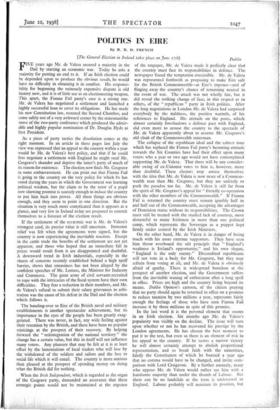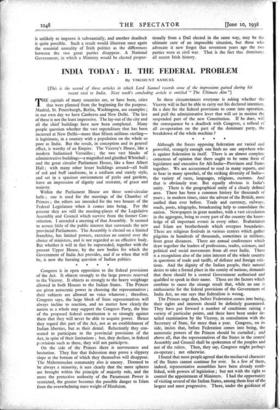POLITICS IN EIRE
By R. B. D. FRENCH
[The General Election in Ireland takes place on lune r7114 Dublin FIVE years ago Mr. de Valera secured a majority in the Dail by starting an economic war. Today he asks a majority for putting an end to it. If an Irish election could be depended upon to produce the obvious result, he would have no difficulty in obtaining it in comfort. His responsi- bility for beginning the ruinously expensive dispute is old history now, and it is of little use as an electioneering weapon. -This apart, the Fianna Fail party's case is a strong one. Mr. de Valera has negotiated a settlement and launched a highly successful loan to cover its obligations. He has made his new Constitution law, restored the Second Chamber, and come safely out of a very awkward corner by the statesmanlike move of the two-party conference which produced the admir- able and highly popular nomination of Dr. Douglas Hyde as first President.
As a piece of party tactics the dissolution comes at the right moment. In an article in these pages last July the view was expressed that an appeal to the country within a year would be Mr. de Valera's best policy, and that if he could first negotiate a settlement with England he might steal Mr. Cosgrave's thunder and deprive the latter's party of much of its reason for existence. The election now finds Mr. Cosgrave in some embarrassment. He can point out that Fianna Fail is going to the country on the very policy for which be has stood during the years in which the Government was learning political wisdom, but the claim to be the tutor of a pupil now showing promise is scarcely enough to induce the country to put him back into power. All these things are obvious enough, and they seem to point in one direction. But the situation is very much more complicated than it appears at a glance, and very few in Ireland today are prepared to commit themselves to a forecast of the election result.
If the settlement of the economic war is Mr. de Valera's strongest card, its precise value is still uncertain. Immense relief was felt when the agreements were signed, but the country is now experiencing the inevitable reaction. Except in the cattle trade the benefits of the settlement are not yet apparent, and those who hoped that an immediate fall in prices would result from it are disappointed and doubtful. A downward trend in Irish industrials, especially in the shares of concerns recently established behind a high tariff barrier, shows that uneasiness has not been allayed by the confident speeches of Mr. Lemass, the Minister for Industry and Commerce. The great army of civil servants recruited to cope with the intricacies of the fiscal system have their own difficulties. They fear a reduction in their numbers, and Mr. de Valera's refusal to submit their salary grievances to arbi- tration was the cause of his defeat in the Dail and the election which follows it.
The handing-over to Eire of the British naval and military establishments is another "spectacular achievement, but its importance in the, eyes of the people has been greatly exag- gerated. There was never, in fact, any wide feeling against their retention by the British, and there have been no popular rejoicings at the prospect of their recovery. By helping forward the " redintegration of the national territory " the change has a certain value, but this in itself will not influence many voters. Any pleasure that may be felt at it is at least offset by the lamentations of local traders who will lose by the 'withdrawal of the soldiers and sailors and the loss to social-life which it will entail. The country is more anxious than pleased at the prospect of spending money on doing what the British did for nothing.
When the Irish Independent, which is regarded as the organ of the Cosgrave party, demanded an assurance that these strategic - points would not be maintained at the expense of the taxpayer, Mr. de Valera made it perfectly clear that the country must face its responsibilities in defence. The newspaper found the temptation irresistible. -Mr. de Valera was represented forthwith as proposing to make Eire safe for the British Commonwealth—at Eire's expense—and of flinging away the country's chance of remaining neutral in the event of war. The attack was not wholly fair, but it did reveal the striking change of face, in this respect as in others, of the " republican " party in Irish politics. After the long negotiations in London Mr. de Valera had surprised everybody by the mildness, the positive warmth, of his references to England. His attitude on the ports, which almost certainly foreshadows a defence pact with England, did -even more to arouse the country to the spectacle of Mr. de Valera apparently about to assume Mr. Cosgrave's old cloak of the Commonwealth statesman.
The collapse of the republican ideal and the calmer tone which has replaced the Fianna Fail party's hectoring attitude towards the Six Counties have had their effect upon many voters who a year or two ago would not have contemplated supporting Mr. de Valera. That there will be any consider- able swing of ex-Unionist votes to him is, however, more than doubtful. These electors may amuse themselves with the idea that Mr. de Valera is now more of a Common- wealth man than Mr. Cosgrave, but they are unlikely to push the paradox too far. Mr. de Valera is still far from the spirit of Mr. Cosgrave's appeal for " friendly co-operation with the other members of the Commonwealth." If Fianna Fail is returned the country must remain ignobly half in and half out of the Commonwealth, accepting the advantages of Dominion status without its responsibilities. The Crown must still be treated with the studied lack of courtesy, most distasteful to many Irishmen in more than one political camp, which represents the Sovereign as a puppet kept firmly under control by the Irish Ministers.
On the other hand, Mr. de Valera is in danger of losing touch with his more extreme supporters. They have seen him throw overboard the old principle that " England's weakness is Ireland's opportunity," and his own slogan, " England is the only enemy." Discomfited republicans will not vote in a body. for Mr. Cosgrave, but they may refrain from voting at all, and Mr. de Valera is obviously afraid of apathy. There is widespread boredom at the prospect of another election, and the Government suffers from the inevitable waning of enthusiasm after a long spell in office. Prices are high and the country living beyond its means. Dublin Opinion's cartoon, of the citizen praying that no party should again be returned to office on a promise to reduce taxation by two millions a year, represents fairly enough the feelings of those who have seen Fianna Fail increase it by three millions in spite of this promise.
In the last word it is the personal element that counts in an Irish election. Six months ago Mr. de Valera's popularity was visibly on the decline. The issue will turn upon whether or not he has recovered his prestige by the London agreements. He has chosen the best moment to put it to the test, but even so there is an element of risk in his appeal to the country. If he scores a narrow victory he will almost certainly attempt to abolish proportional representation, and so break faith with the minorities, falsify the Constitution of which he boasted a year ago that no comma would have to be changed, and invite com- parison with Lord Craigavon. By a further anomaly, many who oppose Mr. de Valera would rather see him with a handsome majority than under the thumb of Labour. But there can be no landslide as the term is understood in England. Labour probably will maintain its position, but is unlikely to improve it substantially, and another deadlock is quite possible. Such a result would illustrate once again the essential unreality of Irish politics as the differences between the two great parties disappear. A National Government, in which a Ministry would be elected propor- tionally from a Dail elected in the same way, may be the ultimate cure of an impossible situation, but those who advocate it now forget that seventeen years ago the two parties were at civil war. That is the fact that dominates all recent Irish history.











































 Previous page
Previous page